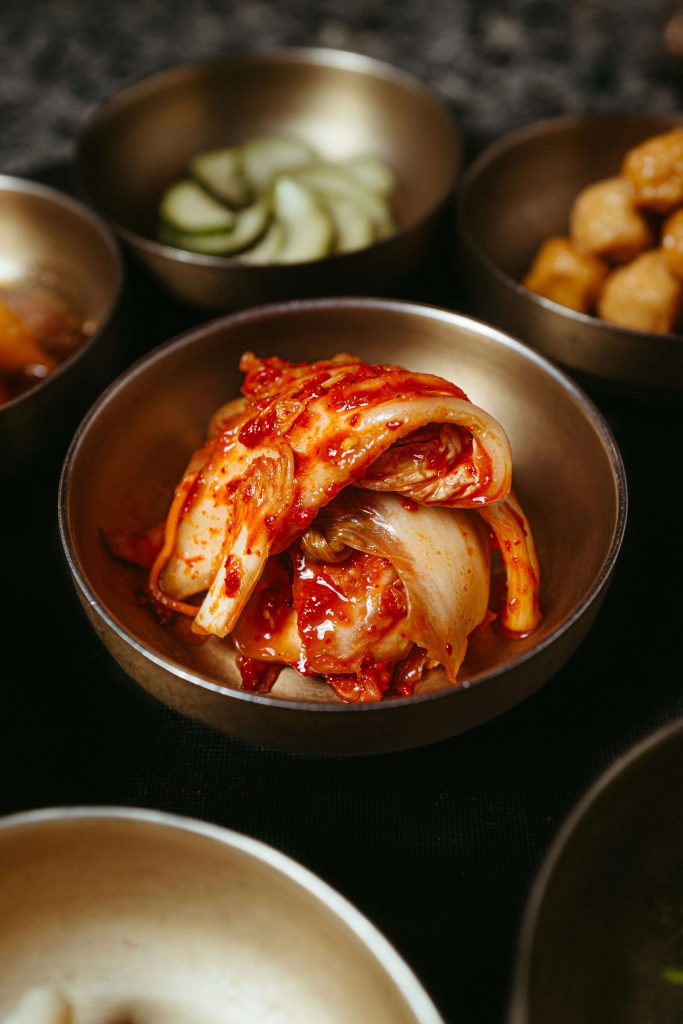If you’ve walked past jars of kimchi in the fridge aisle and wondered what the hype is all about, you’re not alone.
I discovered kimchi a few years ago while experimenting with gut-friendly foods, and it quickly became a kitchen staple. It’s tangy, spicy, and packed with goodness — a great way to boost both flavour and health without much effort.
So, what exactly is kimchi?
Kimchi is a traditional Korean side dish made by fermenting vegetables — usually cabbage or radish — with garlic, ginger, chilli, and salt. It’s a little sour, a little spicy, and full of flavour. Every batch is slightly different depending on what’s used and how long it’s fermented.
While it can be eaten on its own (like a pickle), it’s also delicious added to stir-fries, fried rice, stews, or even topped on avo toast for an extra kick.
Whether you’re buying a jar from your local deli or trying your hand at making your own, here’s why you might want to include more of it in your diet.
Read more: How to make kimchi
Good for your gut
Kimchi is rich in probiotics — the friendly bacteria that support digestion. Fermented foods like kimchi help feed your gut microbiome, which plays a key role in everything from mood to immunity. If you’ve been feeling a bit sluggish or bloated, adding a spoonful of kimchi to your meals could make a difference.
Rich in nutrients
Low in calories but full of vitamins, kimchi offers a little bit of everything: vitamin C, vitamin K, iron, folate and more. Thanks to the mix of veg and the fermentation process, the nutrients are also easier for your body to absorb.
Supports heart health
Some studies suggest that kimchi may help reduce cholesterol levels and improve blood pressure. That’s partly thanks to its anti-inflammatory compounds and the fermentation process, which creates bioactive compounds that benefit the heart.

Helps balance blood sugar
There’s early evidence that eating fermented kimchi may help improve blood sugar levels — useful if you’re trying to manage energy slumps or just feel more balanced throughout the day. This benefit appears more pronounced with the fermented versions, so check the label before buying.
May aid weight management
While it’s no magic solution, kimchi is low in calories, high in fibre, and supports a healthy gut — all of which can help with weight management. Some small studies have linked fermented kimchi to improved metabolic health, including reduced belly fat.
Fights inflammation
Kimchi contains natural compounds that may help calm inflammation in the body. This can have wide-reaching effects, from supporting brain health to improving skin and keeping your immune system in check.
Kimchi is generally safe for most people, but because it’s fermented, it may cause bloating at first — especially if you’re new to these foods. It’s also naturally high in salt, so if you’re watching your sodium intake, keep portions modest and drink plenty of water.
For the best health benefits, look for unpasteurised versions in the fridge section (heat kills the probiotics). Or better yet, try making your own at home — it’s easier than you think and a fun weekend kitchen project.
Quick tip: Add kimchi to scrambled eggs, use it in a grilled cheese sandwich, or mix it into a simple noodle dish for a quick, flavour-packed meal.
Kimchi is more than just a trendy food – it’s a flavourful, functional dish that can do a lot for your health. Whether you’re into gut health, curious about fermented foods, or just want to try something new, kimchi is worth adding to your plate.
TRY THIS RECIPE: KOREAN SHORT RIBS WITH SPICY KIMCHI CUCUMBERS
Image: Pexels

